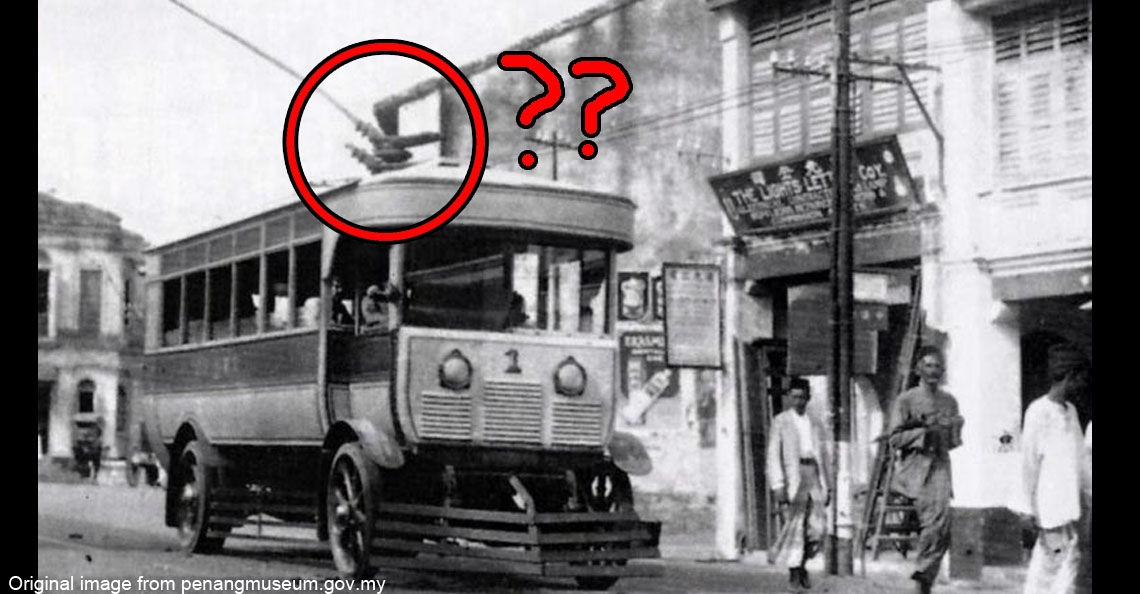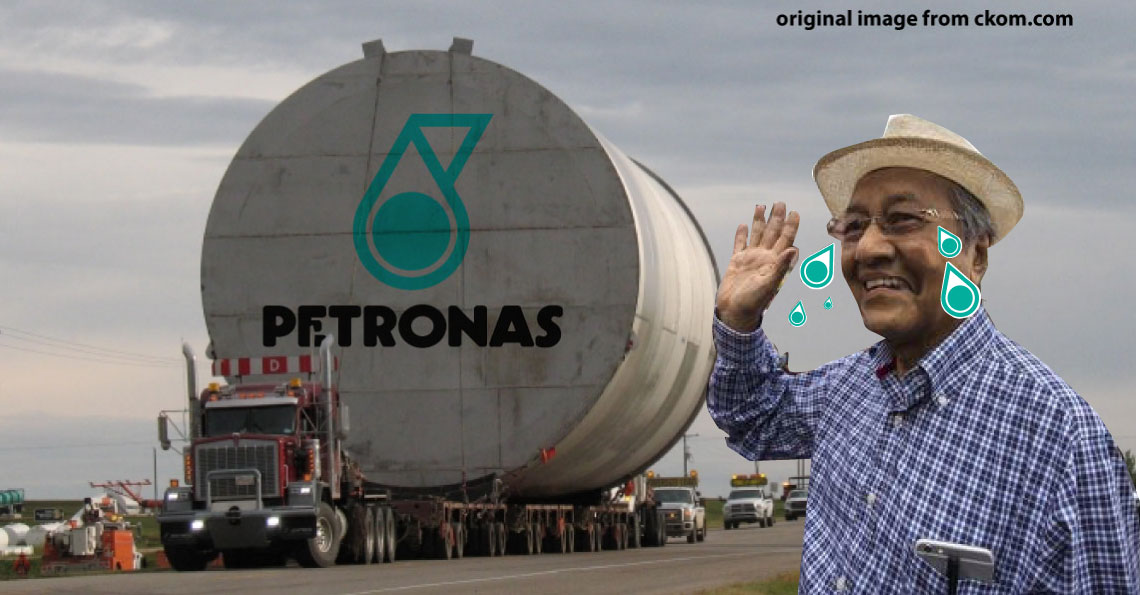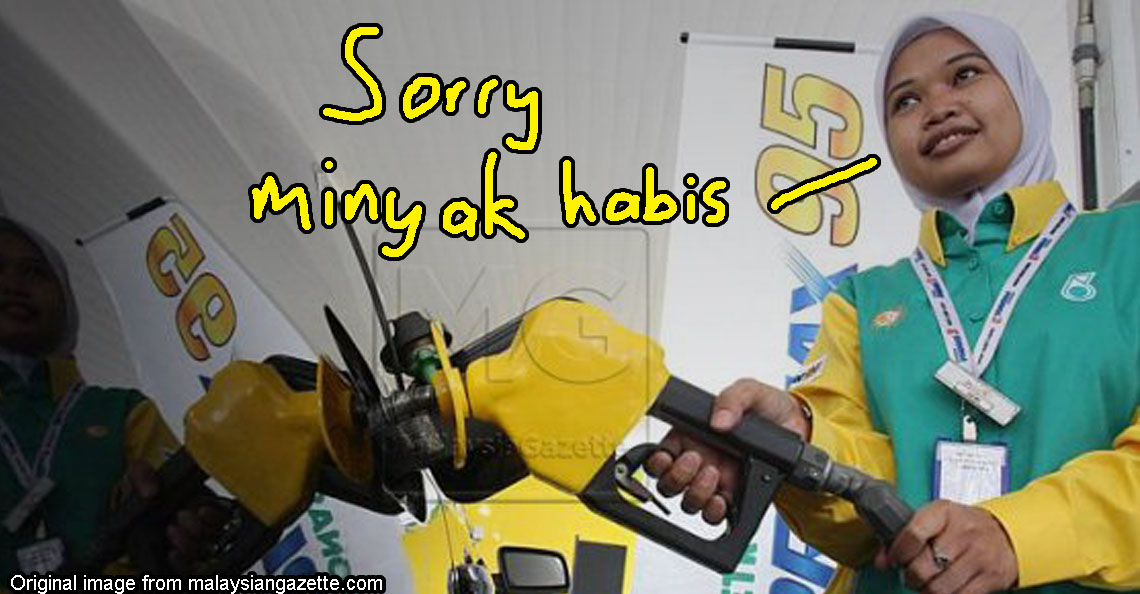OMG, petrol price has decreased! But why are these people complaining la??
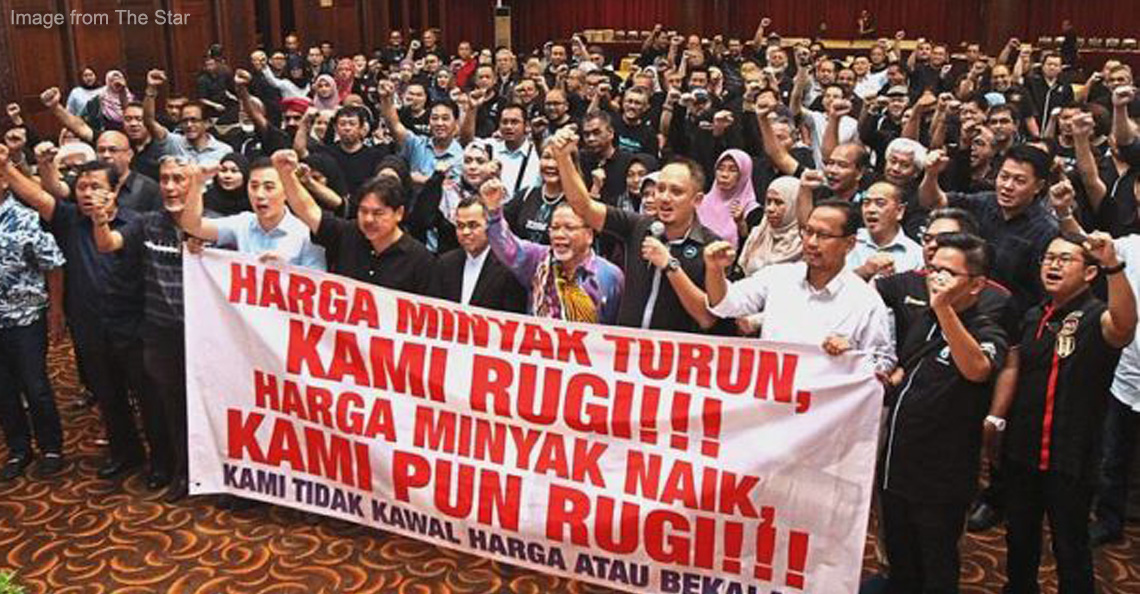
- 369Shares
- Facebook305
- Twitter11
- LinkedIn10
- Email11
- WhatsApp32
Orait, we know this news is sooooo last year but let’s just treat this as a #throwbaek la. #ihatecilisos
Just before new year, Malaysians were shocked by the sudden news of how petrol stations would no longer be operating for 24 hours as usual. It was reported that the peeps who own and operate petrol stations (known as petrol dealers) would operate petrol stations for only 18 hours to cut operating costs. Netizens were prettyyyyyy unhappy with this news.
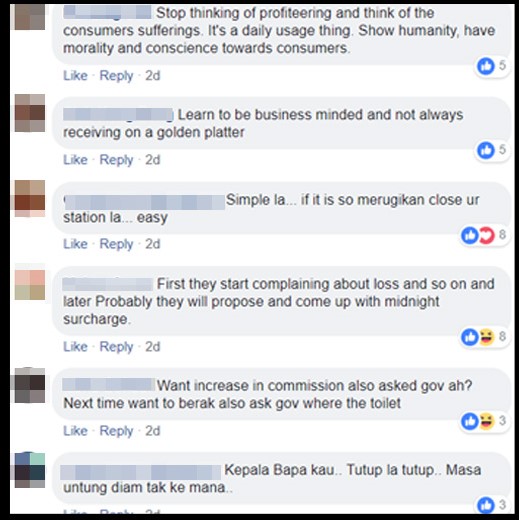
And these dealers (as in petrol dealers and not… uh… other kind of dealers) also suggested to let go some of their employees at their petrol stations. Aiyo, why on earth did they suggest things like this?? Apparently, it’s because the gomen has decided to implement a weekly petrol price float.
Initially, the Petrol Dealers Association Malaysia (PDAM) had not only suggested these cost-cutting move but also demanded other things too. PDAM had proposed for the gomen to introduce a new price mechanism to replace the current one, an increase in commission for dealers and to not use price float as they claimed they had suffered huge losses from it.
Woah, wha-? If you’re scratching your head as you’re reading this, then let us explain the most baaaaasic stuff about a petrol station and that is…
Profit from operating petrol stations can only be gained from… selling petrol (duh!)
So, we got in touch with this writer’s friend, Kadir (not real name cos he’s too shy to be known), who is also a dealer la to find out how a petrol station operates. The answer to that is:
“Petrol stations operate somewhat like kedai runcit. Dealers would buy petrol from oil companies and sell them to consumers.” – Kadir to CILISOS.
This would mean dealers don’t only get all the profit to themselves (yay!) but also bear all the losses from this business as well (yikes). And, unlike kedai runcit, dealers would have to purchase petrol at a global petrol price (which is quite inconsistent btw). And this inconsistency may cause some losses to dealers. But how?
Imagine buying your favourite book at RM45 today only to find out that the same book is on sale the following week at RM20. Demmm, you could’ve saved RM25 for that book, right? Well, the price of petrol works somewhat like this too. Just replace the book to petrol and prices of the book to… well… weekly prices of petrol lor.

Kadir also told us that dealers get commission from oil companies for selling petrol. However, he noted that their commissions would be deducted to pay things like oil fees to the oil companies. Therefore, if dealers are commissioned 15 sens per litre for selling petrol, then they may only be getting less than that.
So, are there any other ways for dealers to gain profit? Y’know… like those convenience stores they have??
As a matter of fact, the then Domestic, Trade, Cooperatives and Consumerism Minister, Datuk Seri Hamzah Zainudin had urged petrol dealers to be more creative in business ideas and not solely depend on petrol. He added that a dealer in his hometown of Selama, Perak made a thriving business by also operating a cafe and launderette at his station.
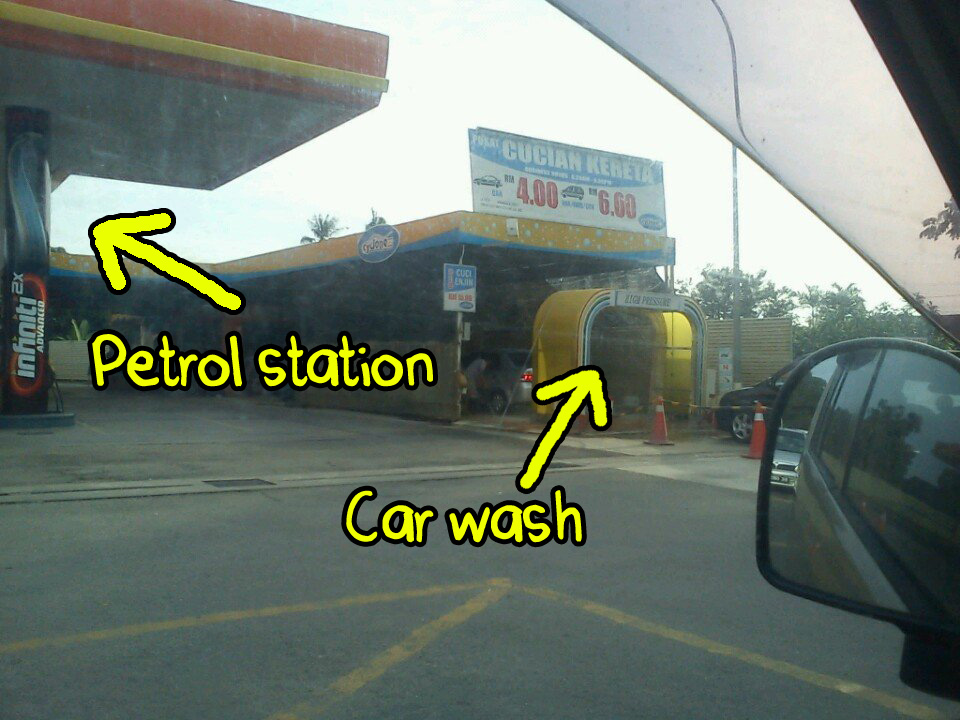
Kadir told us that convenience stores may not be much of a help when it comes to covering the losses from selling petrol la.
“Normally the profit from convenience store would be used to restock the store itself (turnover).” – Kadir told CILISOS.
So, dealers can open up various shops at a petrol station yet it may not have any effect to the operating costs of a petrol station. And don’t come to us saying that these dealers should go cashless to reduce the cost of hiring employees.
This is cos we actually found out that Petron had teamed up with wicet WeChat Pay Malaysia while Petronas introduced a Setel e-wallet app to enable us to pay through e-wallet. Shell, on the contrary, introduced a 24 hour unmanned petrol mart where consumers can just purchase anything from its convenience store using a cashless method.
So, if our petrol stations are THAT maju, then dealers won’t have much to worry about la right? In addition, the gomen assured everyone that…
The latest price system is DIFFERENT from the ones introduced by the previous gomen
If ugaiz have been following the petrol price news, then you may understand why PDAM is demanding the gomen for several things (as mentioned in the intro). But if you don’t, allow us to simplify it for you.
PDAM actually learnt (the hard way) that they could suffer losses of up to RM61 MILLION when the previous gomen implemented the monthly, then weekly price float.
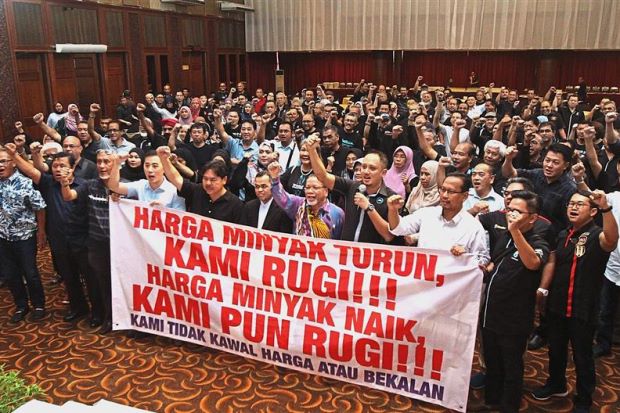
Price float is actually a pricing system where the gomen will announce a new petrol price based on the average global crude price. If the gomen uses a monthly price float system, then it will announce the prices monthly. And if the gomen uses weekly price float system, then it’ll announce the prices weekly lor. You can read our article about this system here.
But PDAM wanted the gomen to implement a different pricing system called the Dealers Guaranteed Margin (DGM). Under DGM, petrol dealers would be compensated by oil companies if the petrol price dropped after they ordered petrol from the companies. And if the price increased after the orders are made, then the dealers would compensate the companies instead. However, some oil companies weren’t fond of this mechanism.
But the gomen didn’t implement DGM cos it wants to fulfill its promises to the rakyat to stabilise the price of petrol and introduce targeted petrol subsidies (which is in the manifesto btw). Although the gomen initially placed a fixed petrol price, it changed its mind and implemented the weekly petrol price float similarly to the ones implemented by the previous gomen.
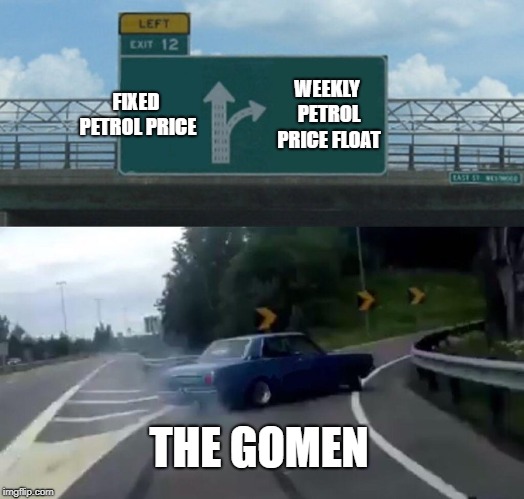
This time around, the gomen wanted to be committed to reduce fuel price while the global crude prices have fallen. In fact, PKR’s Vice President, Rafizi Ramli mentioned that the decision was to enable the rakyat to enjoy the global crude prices which is dropping.
Anddddd the Finance Minister, Lim Guan Eng had assured the rakyat that the weekly price float wouldn’t be the same as the ones implemented by the BN gomen. The previous gomen set a maximum petrol price and allowed dealers to sell petrol at whichever prices they want.
The current gomen, on the contrary, would ensure that dealers would sell petrol at a fixed price set by the gomen. The gomen would also subsidise petrol prices if it exceeds RM2.20 for RON95.
Speaking of subsidies, the gomen had reportedly spent RM4.89 billion on subsidies for RON95 and diesel last year. Surprisingly, diesel took up most of the money spent cos, according to Guan Eng, it was heavily used for commercial and industrial sectors besides Sabahans and Sarawakians (in general).
Having said that…
Should we all rush to the nearest petrol stations to fuel up??
Well, you may wanna do that cos, at the time of writing, we found out that the petrol prices have decreased by 27 sens for RON95 and RON97 while diesel price reduced by 14 sens! This is thanks to the pricing system that the gomen is currently using la.
But if you wanna rush to the nearest petrol station cos you fear that it would be operating for 18 hours only, then you may wanna think twice. This is cos petrol stations will be operating as usual. Since the gomen has already fulfilled PDAM’s demands to increase dealers’ commission from 12 sens to 15 sens per litre, dealers may want to adhere to the directive of the Ministry of Domestic Trade and Consumers Affairs.
Having said that, petrol stations may look like this over the weekend:
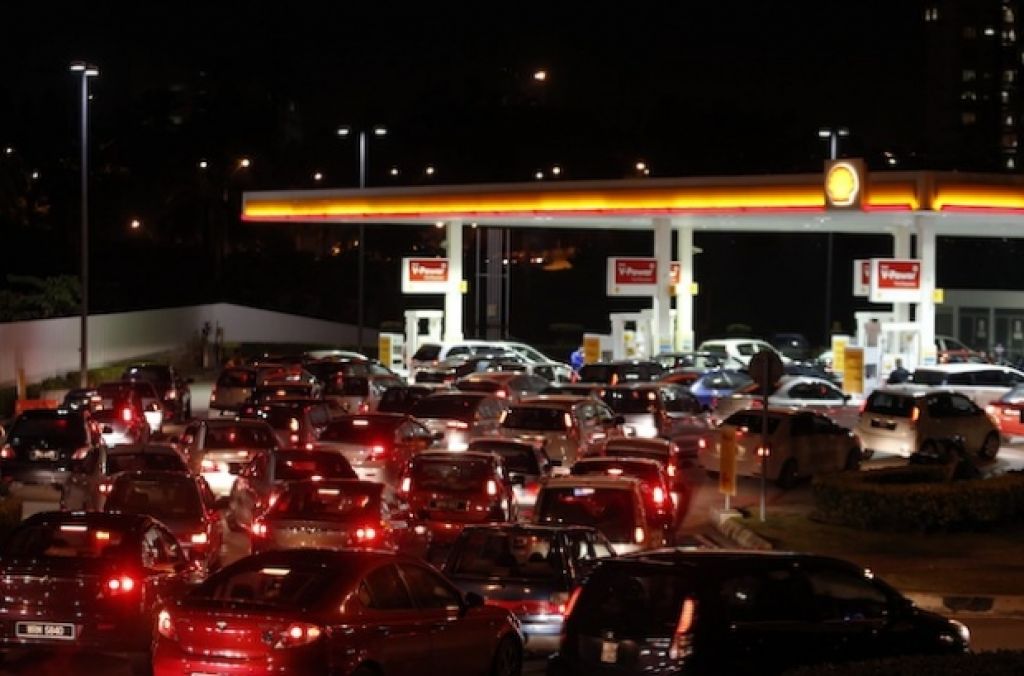
- 369Shares
- Facebook305
- Twitter11
- LinkedIn10
- Email11
- WhatsApp32

